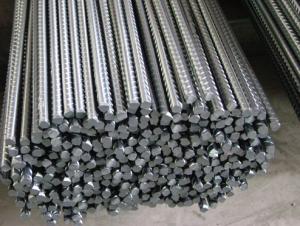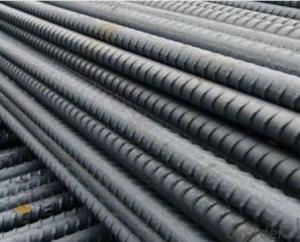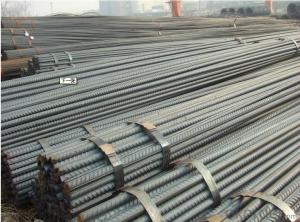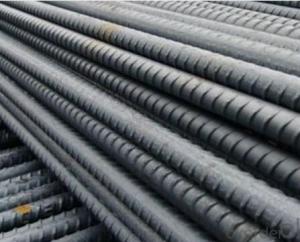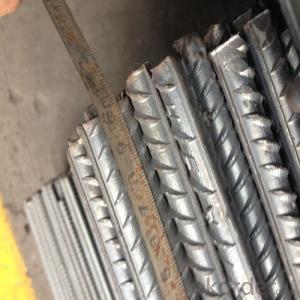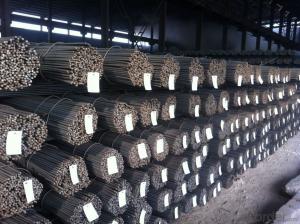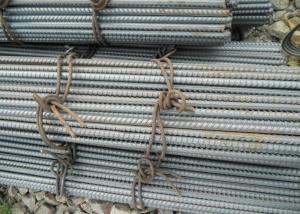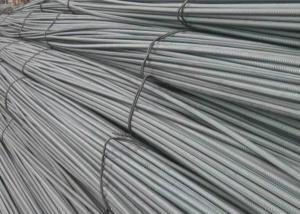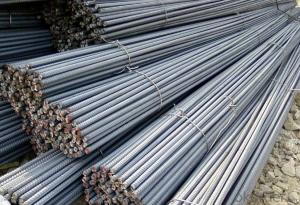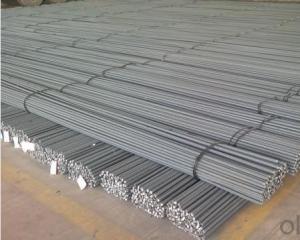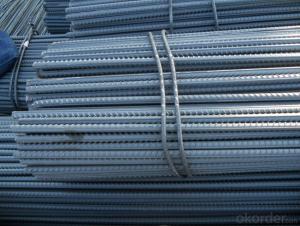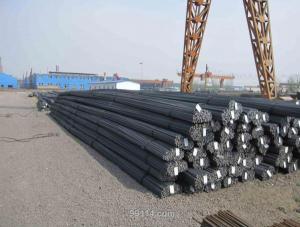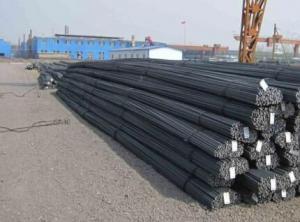Eight mm Cold Rolled Steel Rebars with High Quality
- Loading Port:
- Tianjin
- Payment Terms:
- TT or LC
- Min Order Qty:
- 50 m.t.
- Supply Capability:
- 15000 m.t./month
OKorder Service Pledge
OKorder Financial Service
You Might Also Like
1. Specifications of Eight mm Cold Rolled Steel Rebars with High Quality:
Name | Cold Rolled Steel Rebar | |
Diameter | 6mm,8mm,10mm,12mm,14mm,16mm,18mm,20mm, 22mm,25mm,28mm,32mm,36mm,40mm,50mm | |
Length | 6M, 9M,12M or as required | |
Price | Keep lower operating costs so as to offer competitive price for our clients | |
Label | to be specified by customer, generally, each bundle has 1-2 labels | |
Application | Building, construction | |
Invoicing | Actual or Theoretical Weight Basis as buyer’s request. | |
2. Theoretical weight and section area of each diameter of Eight mm Cold Rolled Steel Rebars with High Quality as below for your information:
Diameter(mm) | Section area (mm²) | Mass(kg/m) | Weight of 12m (kg) | Pcs/ton |
8 | 50.27 | 0.395 | 4.74 | 210.97 |
3. Packaging & Delivery of Eight mm Cold Rolled Steel Rebars with High Quality:
Packaging Detail: products are packed in bundle and then shipped by container or bulk vessel, deformed bar is usually naked strapping delivery, when storing, please pay attention to moisture proof. The performance of rust will produce adverse effect.
Each bundle weight: 2-3MT, or as required
Payment terms: TT payment in advance or Irrevocable LC at sight.
Trade terms :FOB, CFR, CIF
Delivery Detail: within 45 days after received advanced payment or LC.
4. FAQ:
Q1: Why buy Materials & Equipment from OKorder.com?
A1: All products offered byOKorder.com are carefully selected from China's most reliable manufacturing enterprises. Through its ISO certifications, OKorder.com adheres to the highest standards and a commitment to supply chain safety and customer satisfaction.
Q2: How do we guarantee the quality of our products?
A2: We have established an advanced quality management system which conducts strict quality tests at every step, from raw materials to the final product. At the same time, we provide extensive follow-up service assurances as required.
Q3: How soon can we receive the product after purchase?
A3: Within three days of placing an order, we will arrange production. The shipping date is dependent upon the quatity, how many sizes you want and the plan of production, but is typically 1 month to 2 month days from the beginning of production.
5. Images of Eight mm Cold Rolled Steel Rebars with High Quality:
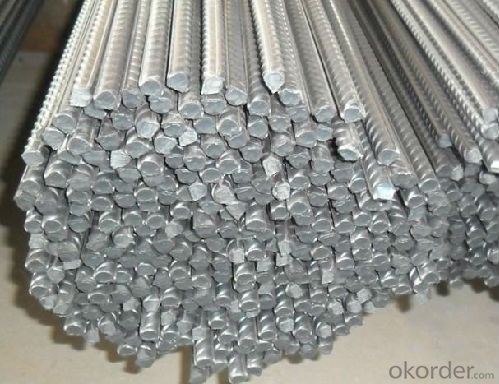
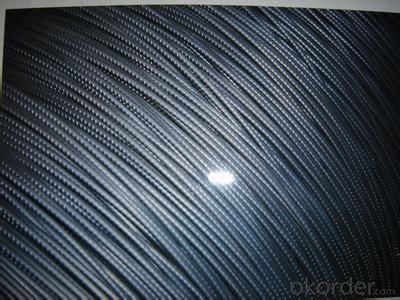
- Q:What are the factors to consider while choosing the right type of steel rebar for a project?
- When choosing the right type of steel rebar for a project, there are several factors to consider. These include the specific requirements of the project, such as the structural design, load-bearing capacity, and environmental conditions. The grade and size of the rebar must also be taken into account, as they determine its strength and ability to withstand forces. Additionally, factors like corrosion resistance, cost, and availability are important considerations to ensure the selected steel rebar is suitable for the project's needs.
- Q:How are steel rebars used in the construction of water treatment plants?
- Steel rebars are used in the construction of water treatment plants to reinforce the structural integrity of various components, such as concrete foundations, walls, and floors. These rebars help to provide strength and support, ensuring that the water treatment plant can withstand heavy loads, seismic activity, and other environmental factors.
- Q:How do steel rebars impact the overall flexibility of a structure?
- Steel rebars, also referred to as reinforcing bars, play a crucial role in enhancing the overall flexibility of a structure. These bars are typically utilized in reinforced concrete structures to bolster tensile strength and enhance the structural integrity of the building. The integration of steel rebars in concrete significantly augments the flexibility of a structure. Concrete itself possesses strength in compression but weakness in tension. By incorporating rebars, the structure becomes more adept at withstanding tensile forces and resisting bending or deformation caused by external loads or environmental factors. The rebars function as reinforcement by assimilating and dispersing tensile forces throughout the structure, aiding in the prevention of cracks and ensuring a more uniform distribution of stress. This is particularly vital in regions prone to seismic activity or high wind loads, where structures must possess the ability to flex and absorb the energy exerted upon them. Furthermore, the presence of steel rebars also permits the creation of thinner and lighter concrete sections. This contributes to the overall flexibility of the structure by reducing the dead load, rendering it more responsive and adaptable to diverse conditions. In summary, steel rebars have a significant impact on the overall flexibility of a structure by furnishing tensile strength, averting cracks, distributing stress, and enabling the implementation of lighter and thinner concrete sections. By enhancing the structural integrity and resilience, the inclusion of rebars ensures that the building can withstand external forces while preserving its stability and flexibility, ultimately contributing to its longevity and safety.
- Q:How do steel rebars help in distributing load in a structure?
- Steel rebars help in distributing load in a structure by providing reinforcement and strength to concrete. When embedded within the concrete, rebars increase its tensile strength, allowing it to better resist cracking and deformation under load. This distribution of load helps to prevent concentrated stress points and ensures a more even distribution of forces throughout the structure, increasing its overall stability and durability.
- Q:How do steel rebars affect the overall flexibility of concrete structures?
- Steel rebars greatly enhance the overall flexibility of concrete structures. The addition of steel rebars to concrete increases its tensile strength, allowing it to better resist cracking and deformation under load. Concrete on its own is strong in compression, but weak in tension. By incorporating steel rebars within the concrete, it creates a composite material that combines the compressive strength of concrete with the tensile strength of steel. The rebars act as reinforcement, distributing the load across the structure and preventing the concrete from failing in tension. This reinforcement helps to limit the formation and propagation of cracks, as the rebars bear the tensile stress and prevent the concrete from completely separating. Consequently, the presence of rebars greatly enhances the overall flexibility and ductility of the concrete structure by enabling it to withstand various forces and movements without catastrophic failure. Moreover, steel rebars also improve the structural stability of concrete elements. By providing additional strength and support, they help to prevent excessive deflection, bending, or buckling of the structure, ensuring it can withstand external loads and environmental conditions. This increased flexibility and stability contribute to the durability and longevity of the concrete structure, making it more resistant to factors such as seismic activity, temperature fluctuations, and shrinkage. In summary, steel rebars play a crucial role in enhancing the overall flexibility of concrete structures. They provide the necessary tensile strength to counteract the inherent weakness of concrete in tension, preventing cracking and deformation. By reinforcing the structure, steel rebars improve its stability, durability, and ability to withstand various forces and movements, thereby ensuring the structural integrity and longevity of the concrete elements.
- Q:Are steel rebars suitable for use in sports stadium construction?
- Yes, steel rebars are suitable for use in sports stadium construction. Steel rebars, which are short for reinforcing bars, are commonly used in construction projects, including the building of sports stadiums. They provide enhanced strength and durability to the concrete structures by reinforcing them against tension forces. The use of steel rebars ensures that the stadium can withstand heavy loads, vibrations, and other external forces that may occur during sporting events or in case of natural disasters. Moreover, steel rebars are resistant to corrosion, which is crucial in maintaining the structural integrity of the stadium over time. Therefore, steel rebars are a reliable and suitable choice for use in sports stadium construction.
- Q:What are the guidelines for handling and disposing of steel rebars after demolition?
- The guidelines for handling and disposing of steel rebars after demolition include the following: 1. Identification: It is important to identify the steel rebars and differentiate them from other construction debris. This can be done by marking or labeling the rebars appropriately. 2. Segregation: Separate the steel rebars from other waste materials on-site. This ensures that they can be properly handled and recycled or disposed of accordingly. 3. Demolition process: During the demolition process, care should be taken to minimize damage to the steel rebars. This includes using appropriate tools and techniques to avoid excessive bending or cutting, which can affect their recyclability. 4. Removal and transportation: After demolition, the steel rebars should be carefully removed from the site and transported to the designated area for further processing or disposal. This may involve the use of machinery or manual labor, depending on the quantity and size of the rebars. 5. Recycling: Steel rebars are highly recyclable and should be sent to a recycling facility whenever possible. These facilities can process the rebars and convert them into new steel products, reducing the need for extracting and manufacturing new materials. 6. Disposal: If recycling is not feasible, the steel rebars may need to be disposed of in accordance with local regulations. This may involve taking them to a designated landfill or waste disposal site that can handle construction materials. 7. Safety precautions: It is important to follow safety precautions when handling steel rebars. This includes wearing appropriate personal protective equipment (PPE) such as gloves and safety glasses, as well as using proper lifting techniques to prevent injuries. 8. Compliance with regulations: Ensure that all handling and disposal activities comply with local, state, and federal regulations. This may include obtaining necessary permits or licenses, as well as adhering to specific guidelines for waste management and recycling. By following these guidelines, the handling and disposal of steel rebars after demolition can be done in an environmentally responsible and safe manner, contributing to sustainable construction practices.
- Q:What is the effect of exposure to extreme temperatures on steel rebars?
- Exposure to extreme temperatures can have a significant effect on steel rebars. When exposed to high temperatures, steel rebars can undergo thermal expansion, causing them to expand and potentially lose their original shape. This expansion can lead to cracks, weakening the rebars' structural integrity. On the other hand, exposure to extremely low temperatures can cause the rebars to contract, which may result in stress and potential cracking. Overall, extreme temperature exposure can compromise the strength and durability of steel rebars, posing risks to the structures they support.
- Q:Are steel rebars resistant to earthquakes?
- Yes, steel rebars are designed to enhance the strength and structural integrity of concrete structures, making them more resistant to the forces exerted during earthquakes.
- Q:What is the average tensile strength of steel rebars?
- The average tensile strength of steel rebars typically ranges from 400 to 600 megapascals (MPa).
1. Manufacturer Overview |
|
|---|---|
| Location | |
| Year Established | |
| Annual Output Value | |
| Main Markets | |
| Company Certifications | |
2. Manufacturer Certificates |
|
|---|---|
| a) Certification Name | |
| Range | |
| Reference | |
| Validity Period | |
3. Manufacturer Capability |
|
|---|---|
| a)Trade Capacity | |
| Nearest Port | |
| Export Percentage | |
| No.of Employees in Trade Department | |
| Language Spoken: | |
| b)Factory Information | |
| Factory Size: | |
| No. of Production Lines | |
| Contract Manufacturing | |
| Product Price Range | |
Send your message to us
Eight mm Cold Rolled Steel Rebars with High Quality
- Loading Port:
- Tianjin
- Payment Terms:
- TT or LC
- Min Order Qty:
- 50 m.t.
- Supply Capability:
- 15000 m.t./month
OKorder Service Pledge
OKorder Financial Service
Similar products
New products
Hot products
Related keywords
